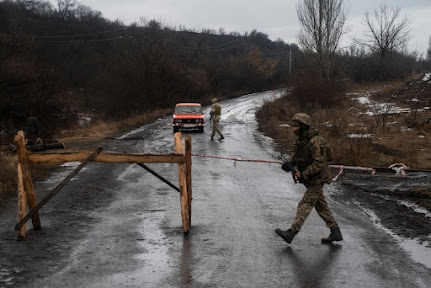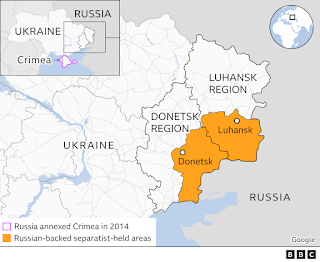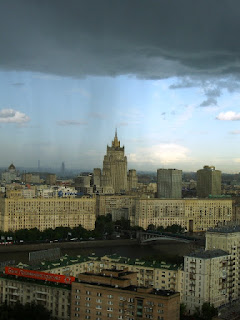Wednesday, February 23, 2022
On the heels of Monday's announcement by the Kremlin that it was recognizing the independence of Ukraine's Donetsk and Luhansk regions, it now appears that Russian tanks and artillery may be moving into the region.
So where is this heading? I wish I could say for certain. I do, however, have a few ideas.
As I've mentioned before, this conflict is about a lot more than Ukraine. If all Putin wanted to do was to keep Ukraine out of NATO, he didn't need to invade. All Russia had to do was keep hold of the Crimea, which every NATO member recognizes as part of Ukraine. It seems highly unlikely that NATO would ever expand into a country that is in part occupied by Russia, so Russia already had a near-guarantee that NATO would not be inviting Kyiv to join the alliance. In other words, if we're looking just at the question of Ukraine and NATO (and Georgia, for that matter), there was no need for any of this.
But what if you have a more long-term goal, like pushing NATO westward? This, in my opinion, is what Putin is trying to do, with the current developments in Ukraine perhaps constituting just one step in this project.
Since the 1990s, NATO has expanded from 16 members to 30. Not only has the alliance gone on to include all of the USSR's erstwhile Warsaw Pact partners from 1989, but also three former Soviet republics--Estonia, Latvia, and Lithuania.How to reverse this process? It's not something that happens overnight. You have to play a long-term game.
Invading all of Ukraine and somehow trying to occupy the replace the government in Kyiv with pro-Moscow stooges and control the entire country seems awfully messy and difficult. My sense is Putin knows well that this would be a loser's bet.
It makes a lot more sense to pick the low-hanging fruit. The breakaway regions of Luhansk and Donetsk declared their independence in 2014 in the immediate aftermath of Russia's annexation of the Crimea. Limiting an invasion to providing "peacekeepers" to these regions is certainly a less bad option than undertaking a massive land war just to the south of your border.
But that's just it: these are both bad options, at least insofar as the Kremlin is concerned. Since 2014, Luhansk and Donetsk have been Kyiv's headaches. Whenever Moscow wanted to apply pressure on Kyiv, it could do so through its proxies in these regions. Now, they're going to be Moscow's headaches. Even if Moscow's troops encounter no difficulties whatsoever in these regions, the cost of incorporating these poor, post-industrial provinces into Russia would be incredibly expensive even without sanctions.
And the sanctions really do hurt people in Russia, which isn't good for Putin, either. Russians were more willing to put up with the hardships the sanctions created when it came to the Crimea, which most Russians have long considered to be part of Russia, and which is also home to Russia's Black Sea Fleet.
The Russian government has spent billions on the Crimea since 2014 and still it's one of the poorest regions of Russia, but jeez, who wouldn't want the Crimea? Not to trivialize things, but we're talking about one of the most beautiful places on Earth.
But I'm not sure that people in Russia will be quite so patient and understanding when it comes to suffering hardships for the sake of these new acquisitions.
 |
| Welcome to Donetsk! |
And this is Putin's least-bad option right now. This is the choice that makes the most sense, at least relative to invading the whole country. But it still seems like a steep price to pay for a sketchy set of returns.
Looked at from a short-term perspective, all of this seems like a temper tantrum--sheer stupidity. All Putin is doing right now is further convincing people in Eastern European countries that they should double down on their NATO commitments. Going to war just to show everybody you mean business is a bad idea, particularly when it's taking place in your own neighborhood.
But in the long term, Putin's moves over the past several months re Ukraine might make more sense. What would happen, for example, if the Russian-Ukrainian "war" ended up being a largely phony one, at least for the next couple of years? Then let's say there's a change in government in the United States, and someone more amenable to calls for isolationism, unilateralism, and transactional "deal-making" takes office, someone who considers NATO a big rip-off because Europeans allegedly don't spend enough on their military budgets. DJT reportedly wanted to withdraw from NATO, but it wouldn't have to be him in this scenario. It could be anyone trying to appeal to the DJT electorate, proposing to make a grand deal with Putin over NATO more generally.
And meanwhile, there are many Americans who do not know anything about NATO, or who consider it a relic of the Cold War. I think there are a lot of Americans who, right now, are largely indifferent to what the consequences of NATO's disintegration would be.
So, maybe Putin isn't being so stupid or crazy, and perhaps he has thought this through more than he's being given credit for. Or, maybe he's just been in power too long and it's affected his thinking. One or the other.
Moscow Recognizes Two Breakaway Republics: Why do this?
The Monroe Doctrine, Putin, and Post-Soviet Space: Don't Muddy the Waters
***
More commentary, photos, and links can be found in the Borderlands Lounge.







No comments:
Post a Comment